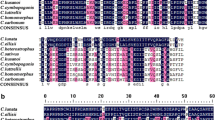Abstract.
Mushroom production is dependent on the quality of the spawn used to inoculate the cultures. In order to produce high-quality spawn, breeding programs for strains resistant to certain diseases and able to form high-quality fruit bodies under standard growth conditions are necessary. The investigation of the molecular basis for mating provides access to the use of mating-type genes in order to facilitate breeding. For research purposes, two mushroom-forming homobasidiomycetes have been used due to their easy cultivation and sexual propagation on defined minimal media: Schizophyllum commune and Coprinus cinereus. The mating-type genes control formation of the dikaryon from two haploid strains. Only the dikaryon is fertile and able to form mushrooms under the right environmental conditions. These genes are now used in mating-type-assisted breeding programs for economically important mushrooms, especially the white button mushroom, Agaricus bisporus, and the oyster mushroom, Pleurotus ostreatus, aiming at high-yield and high-quality standard mushroom production. Most mushroom species posses two mating-type loci that control their breeding. The genes encoded in the A loci lead to the formation of transcription factors that belong to the class of homeodomain proteins. Active transcription factors are formed by heterodimerization of two proteins of different allelic specificities. In nature, this is only the case if two cells of different mating type have fused to combine the different proteins in one cytoplasm. While fusion in homobasidiomycetes is found irrespectively of mating type, exchange of nuclei between mating mycelia is dependent on the products of the B mating-type loci. The B genes form a pheromone and receptor system that enables the fungi to initiate nuclear migration. The molecular details of the two genetic systems controlling breeding in basidiomycetes are presented in this review.
Similar content being viewed by others
Author information
Authors and Affiliations
Additional information
Received revision: 12 June 2001
Electronic Publication
Rights and permissions
About this article
Cite this article
Kothe, .E. Mating-type genes for basidiomycete strain improvement in mushroom farming. Appl Microbiol Biotechnol 56, 602–612 (2001). https://doi.org/10.1007/s002530100763
Received:
Accepted:
Issue Date:
DOI: https://doi.org/10.1007/s002530100763




